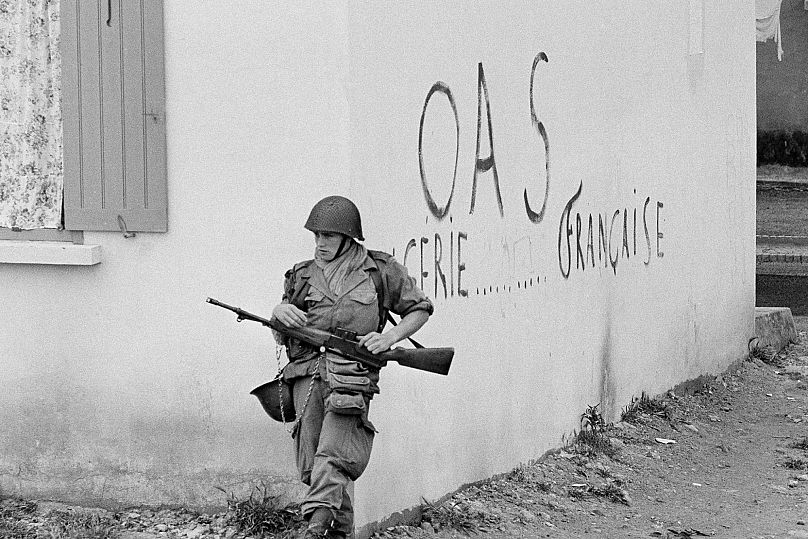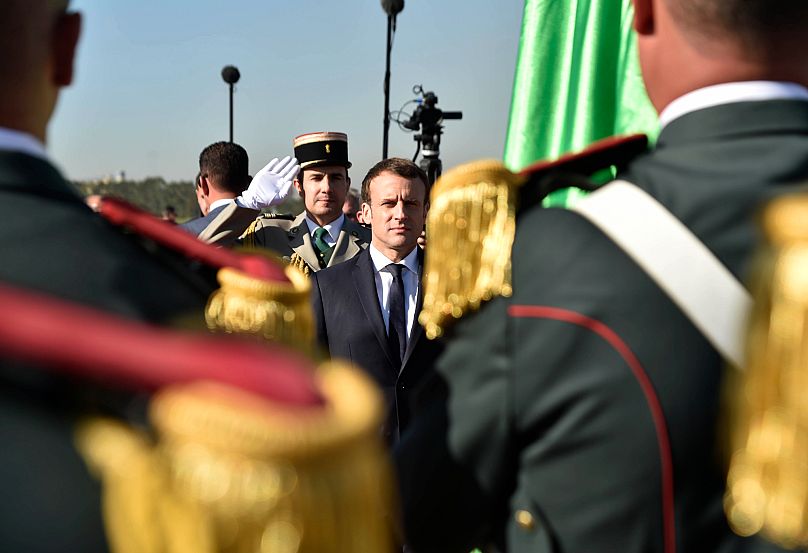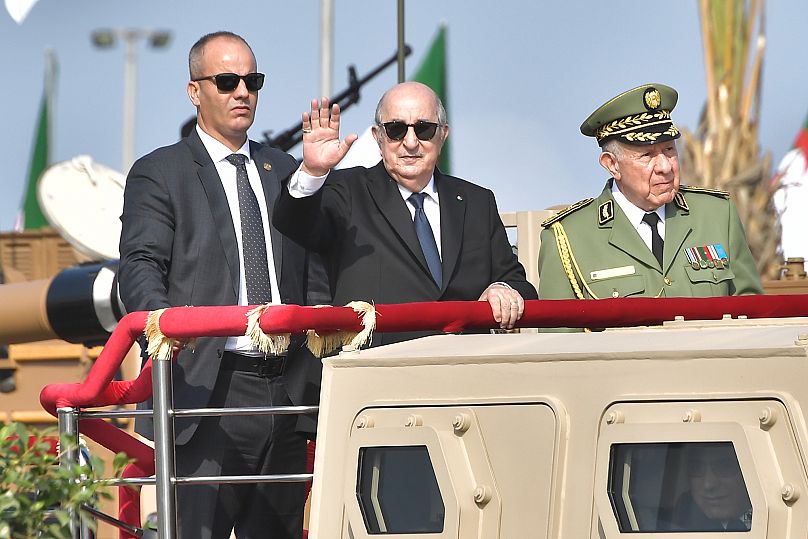As a diplomatic spat between Paris and Algiers continues to sour, Euronews dissects how things got so bad, and where they could go from here.
An increasingly tense dispute between Paris and Algiers has spiralled into what French diplomatic sources told Euronews is the “biggest diplomatic crisis” since Algeria gained independence in 1962.
First triggered by arguments over the contested territory of Western Sahara that reignited last year, the beef further devolved after Algeria's increasingly authoritarian government detained French-Algerian novelist Boualem Sansal and French journalist Christophe Gleizes, who were sentenced by courts to five and seven years in prison, respectively.
Since then, things have only gotten worse, and the total impasse resulted in tit-for-tat expulsions of diplomats from each other’s countries.
In August, French President Emmanuel Macron requested to tighten visa requirements of Algerian diplomats and government representatives, suspending a 2013 bilateral deal over alleged “growing migration difficulties”.
The spat has also seeped beyond France’s borders, as Interior Minister Bruno Retailleau informed Schengen partners of the new restrictions, leading to an Algerian diplomat being denied entry for a holiday in Spain.
University of Oxford professor of North African history James McDoogle told Euronews that the fact that “Algerian diplomats would have to get a visa like anybody else” was “embarrassing and humiliating”, given a post-independence agreement that was meant to give all Algerians, let alone diplomats, visa-free access to France.
‘Unresolved arguments’
The Paris-Algiers tensions are a direct product of France's colonial presence in North Africa, with a former senior French diplomat familiar with the matter describing the relationship as “difficult, as you have to manage the past, the history, as well as the future.”
Algeria’s brutal eight-year war of independence six decades ago, which killed hundreds of thousands and saw the French depart a country they had colonised for over 130 years, still has its echoes in the continued diplomatic battles.
Relations between the Elysée and Algeria’s El Mouradia Palace have ebbed and flowed since 1962, with particular flare-ups when Algeria nationalised French-owned natural resources in the 1970s, followed by France's introduction of a law in the early 2000s enforcing the teaching of “positive influences” of colonialism in French schools.
All of these matters continue to affect the way in which Algiers looks at — and reacts to — anything that France does.
"Algeria often prioritises upholding ideological positions over pragmatic ones … reflecting a foreign policy deeply rooted in anti-colonial legacy and self-preservation," Dr Dalia Ghanem, who serves as program director at the Middle East Council on Global Affairs, told Euronews.
After its quest for independence, Algeria became a centre for anti-colonial and independence movements. Walking the streets of Algiers even today, the offices of the Palestine Liberation Organisation (PLO) and the Western Saharan Polisario Front resistance movements loom large.
As Dr Ghanem explained, support for these causes remains a “foundational issue deeply embedded in the national psyche that dictates Algeria's regional stance and alliances.” It has housed and armed both groups for decades.
Political football
When Western Sahara gained independence from Spain in 1975, it was very quickly annexed by Mauritania and neighbouring Morocco — itself a former French protectorate — to the dismay of Algiers.
Since 1994, the 1,500 km border between Algeria and Morocco — which ended up fighting the Polisario Front until a ceasefire deal was reached in 1991 — has been effectively sealed due to the complete breakdown of diplomatic relations over the issue.
Paris always tried to walk a tightrope between the two, often angering both sides. In 2024, however, Macron’s government, in a possible bid to warm relations with Rabat, subtly endorsed a long-standing Moroccan plan that effectively claims sovereignty over the contested territory.
This enraged an already volatile Algiers, and the current crisis ballooned. However, many believed that this was years in the making, boiling in a pressure cooker of internal politics.
“Algeria's foreign policy is fundamentally shaped by internal political dynamics” about securing the state and portraying France as a threat, Algerian academic Dr Ghanem explained to Euronews.
Prof McDoogle echoed this point, believing this swings both ways. “Whenever it's in the domestic political interest of either country to do so, they give the other one a kicking," he said.
The former French diplomat, however, laid the blame at the feet of Algerian President Abdelmadjid Tebboune, claiming he is trying to ignite anger in the diaspora.
“Tebboune wants to have a very nationalist Algerian population, which will allow him to influence the French political system," they told Euronews.
"Remember that the (French) Fourth Republic fell with the Algerian war, so he knows that Algeria is part of French politics. And today, he says that France is a lever in his politics.”
The Algerian premier has not explicitly expressed these aims.
In a sign of how toxic the debate has become, the former senior official added that they had been receiving violent threats, speaking to Euronews under the condition of anonymity due to serious safety concerns.
Anatomy of a fall
The icy relations of today are a far cry from the late 2010s, when the winds of change seemed to be picking up on both sides of the Mediterranean.
On the presidential campaign trail in 2017, a fresh-faced "political outsider" by the name of Emmanuel Macron talked of “crimes against humanity” committed by France in Algeria, promising a new era of accountability and warmer relations.
Two years later, millions of Algerians took to the streets across the biggest country in Africa, demanding political change as part of the Hirak movement. A new president, who had himself fought off the two main parties in his country, was elected.
But the progress did not last. In Algeria, Dr Ghanem points out that the president slipped increasingly into authoritarianism, on the pretence and “posturing”, particularly over “the regime's relentless focus on the security of the country and its own security, and continuity (of the government)”.
Across the water, it was not long before Macron — with his far-right rivals closing the gap in opinion polls — started denouncing what he called “memorial rent,” or the politics of memory in 2021, which some French experts described as “Macron’s only moment of lucidity”.
Macron’s Algerian counterpart Tebboune returned the accusations, claiming “history should not be falsified,” adding that the French leader “completely pointlessly revived an old conflict.”
Algiers recalled its ambassador and temporarily closed its airspace to French aircraft, including for “counter-terror operations” in the Sahel.
Now, combined with the latest spat, both sides seem to have backed themselves into a corner. Tebboune is digging his heels in, and yet another government in Paris has collapsed as the far right continues to surge in France.
The loudest voices call for escalation rather than conciliation, including the former diplomat, who — despite the threats — did not mince their words.
“(Algiers) only understands force. So it's no use at all to pat them on the back ... to tell them we're friends.”
On the Algerian side, neither the government nor the population seem in the mood for compromise either.
As prominent Algerian writer Kamal Daoud recently observed, “Every time I see young Algerians, (they) hate France more than my parents, who lived through the suffering of colonisation.”














